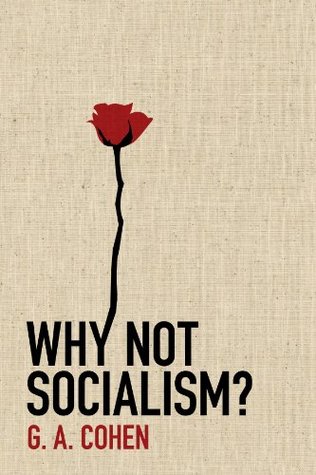More on this book
Kindle Notes & Highlights
but: isn’t this, the socialist way, with collective property and planned mutual giving, rather obviously the best way to run a camping trip, whether or not you actually like camping?
Not if I was camping with strangers. No amount of governance from other strangers would make me feel comfortable I wasn't being taken advantage of or make me feel as though they were my friends
I am not convinced that it is true both that all choices are causally determined and that causal determination obliterates responsibility.
Just because you cannot choose all the circumstances of your life doesn't mean you throw up your hands and give up. It's still your problem and responsibility to make the best of it. Only you are to blame for doing nothing. Whether or not you caused it or should be blamed is irrelevant. The circumstances are set
I can reasonably complain about that to a fellow car-driver, but not to you. I can’t say to you: “It’s awful that I have to take the bus today.”
So do we give everyone cars, regardless of their work and how hard they work, or do we make everyone ride the bus, in order to maintain equality? I suppose that would be equality of outcome, not opportunity. In equality of opportunity you could only own a car if everyone did. Would anyone have a car? I think not
Communal reciprocity is not the same thing as market reciprocity, since the market motivates productive contribution not on the basis of commitment to one’s fellow human beings and a desire to serve them while being served by them, but on the basis of cash reward.
Cash reward is a measure of the worth of the work completed. More work of higher quality that is high in demand will cost more. How do we measure communal reciprocity?
unlike its predecessor feudal civilization, which had the [Christian or other] grace to condemn greed, capitalism celebrates it.)
If you provide work and others desire and pay for that work, is it greed? If you work harder and are paid even more, is that even more greedy? Of course not. How is earing a wage equivalent to greed?
I want to buy cheap and sell dear.
This is called efficiency. If you could buy a product or service and flip it for more money, that means the customer desired it more than the original seller. In this case, the goods have been measured and distributed and the benefit shared by all.
How is not measuring the worth of goods and services somehow more fair?
I serve you in the expectation that (if you are able to) you will also serve me.
Is payment not enough reciprocity for completing labor?
How does socialism work for exteemely high valued work. For example, how many lifetimes of goods and services would you give me for a brick of uranium? Does the community want the uranium? How often do I need to provide the uranium in order to continue receiving goods from the community? Once? Once per day? How is this measured?
not because you want yourself and the other person to flourish,
A business transaction cannot take place unless both parties agree to it. Both are benefiting from the exchange according to the information they have at the time.
Buyers and sellers can and do take advantage if the other has not done their homework in terms of competitove prices. That being said, expediency also bears a cost to all.
A particular person in a market society may face a choice of being a building laborer or a carer or starving, his set of choices being a consequence of everybody else’s choices. But nobody designed things that way, and his restricted options consequently misappear as mere facts of life.
If I produce work that no one requires or desires or is completely unproductive or even counter productive, do I deserve to share the hard work of others?
The point is often made, in resistance to the sentiment of the song, that one cannot be friends with the millions of people who compose a large society:
A friend to all is a friend to none. If there is preferential treatment of some, then all others are at a detriment. To treat all as a sibling would be to put all on equal footing regardless of contribution.


